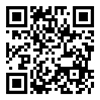 With the help of poet David Hassler, Hartford Hospital nurses crafted a poem that reflects the challenges, rewards and emotions they experienced during the COVID-19 pandemic. During the virtual “Healing Stanzas” workshop, they put their thoughts and emotions into words that Hassler transformed into the community poem, “Human to Human”.
With the help of poet David Hassler, Hartford Hospital nurses crafted a poem that reflects the challenges, rewards and emotions they experienced during the COVID-19 pandemic. During the virtual “Healing Stanzas” workshop, they put their thoughts and emotions into words that Hassler transformed into the community poem, “Human to Human”.
Scan the QR code at right for a video of the verses and a glimpse at the workshop.
Human to Human: Nurses put COVID emotions onto paper
by Hartford Hospital Nurses – Composed May 2022
Some days you underestimate the impact you have on another. A helpful hand, a kind gesture, an ear to listen can be exactly what someone needs just to get through the day. Remember you are a comforter, a care giver, a life changer. You are sunshine in someone’s life. You make the world a better place.
Some days you reflect on yourself before you care for your patients and wonder who is there to care for me. You mourn the words of a dying mother, tell your children you love them and think about your own mortality, the thought that they would grow up without you.
Some days with grace and grit you prepare for the battles of the day. You fight to get out of bed and leave your little ones who want you to play mom all day. You fight to be seen and heard through the halls, to prove you are good at what you do, to make a difference for someone else. You fight to smile behind sadness, to feel worthy of being a nurse with its magnitude of responsibilities, to turn it off at the end of the day and to do it all again tomorrow.
Some days you feel you’ve lost the war. You can’t come up with the right words and don’t know what else to give. You feel guilty for being sad when there are those suffering through much greater situations.
Some days you feel like an actor in the play of your life. You choose to play a character who portrays confidence and joviality rather than revealing the truth of the chaos within. You don the costume of a nurse, undergo a physical and mental transformation to animate your role. You change into your uniform — a specific color signifying your area of practice, a hat, a mask, shoe covers, ID badge with a tag that declares “NURSE” — and become fully immersed. You hang your real clothes and real self in your locker while you put on a performance. But there is no applause, no standing ovation, no flowers at the end of the show.
You return your costume and don your street clothes again. You emerge from the hospital theater and return to your real self, prepared to perform again the next day.
Some days you will touch people in ways you may never fully understand, but they will never ever forget you, how you made them feel. Until you have walked both sides of healthcare — as provider and patient or family — this is hard to know.
Some days you will feel all the feelings in twelve and a half hours — happiness and sadness, joy and pain — and know how lucky you are to feel them regularly and deeply. This is exactly where you want to be, helping a patient and their family overcome the unknown.
Remember we carry the weight of our responsibilities at work and at home. We carry every breath not taken, every back turned to walk away, every dropped shoulder and hung head. We grieve who we were before, the lightness of problems in the air we could comprehend. Hidden behind masks, we have become experts in the windows to the soul, no longer the facial expressions that manifest it.
Together we will heal the pieces of our broken hearts that aren’t so readily accessible. Remember how everyone is hurting, and we are here to hold that memory. Together we carry each other forward, like today when the dementia patient with soft blue eyes smiled at me as I softly took her hand.
For we are the hands that touch and the heart that feels, the soul that is tired and the knees that are weak. We pour out our hearts each day, willing to lay it down for others. Be kind, be human, for there is no other like you. Human to human is the only way to heal.
Work ‘Besties’ Boost Your Spirits and Productivity
By Susan McDonald
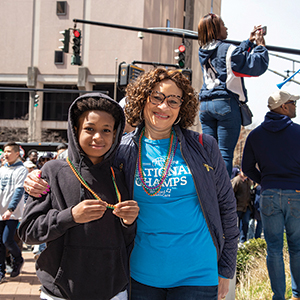 Whether it’s spending a few minutes on Monday rehashing your weekend or going on shopping or gym dates, many adult friendships are forged at work.
Whether it’s spending a few minutes on Monday rehashing your weekend or going on shopping or gym dates, many adult friendships are forged at work.
That’s a good thing, too, since a 2022 Gallup report showed work friendships not only boost our spirits, they increase productivity and engagement during the workday.
“Most of us spend eight plus hours a day, five days a week, doing our chosen jobs. And, many jobs revolve around a common goal — helping patients, building better processes, educating children. That innate sense of camaraderie easily helps us forge bonds with colleagues,” says Jennifer Ferrand, PsyD, director, Hartford HealthCare Well-Being Department.
Friend benefits
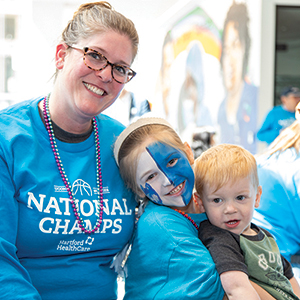 In the workplace, Gallup shows having a close — or even “best” — friend leaves us:
In the workplace, Gallup shows having a close — or even “best” — friend leaves us:
- More likely to share ideas
- More innovative and creative
- Apt to get more work done in less time
- Less likely to get injured doing your job
- Having more fun and feeling increased job satisfaction
- More productive and creating higher-quality work
- Less likely to feel burnt out or stressed
“This is logical when you think how friends naturally support and encourage each other,” Dr. Ferrand explains. “They talk regularly and communicate better. Plus, they are committed to each other and their shared purpose.”
Like healthy relationships outside of work, workplace friendships can relax and motivate us to do better. When there’s a problem, it’s easier to share and receive feedback with someone you trust.
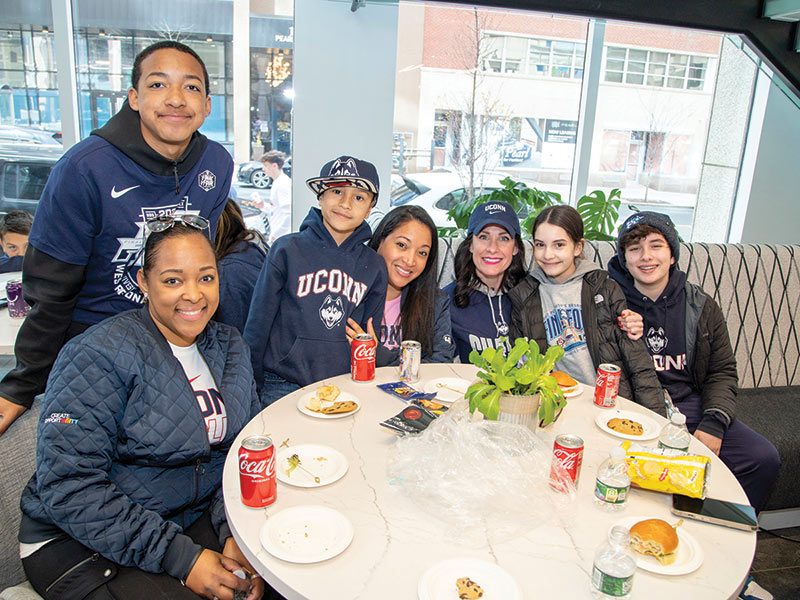
Business benefits
Workplace friendships and camaraderie benefit the employer, too, Dr. Ferrand notes. For example, she says businesses can realize:
- Lower employee turnover
- Improved employee satisfaction
- Fewer sick days taken
- Drop in safety incidents (36% less, according to Gallup)
- Increase in customer engagement and profits
“Work friendships tend to improve our ability to strike a work-life balance as we experience some socialization while at work,” Dr. Ferrand says. “This is key because with the millions who left the workplace during and after the pandemic, we can see that people are not working just for a paycheck any longer. They want and need more from their work days.”
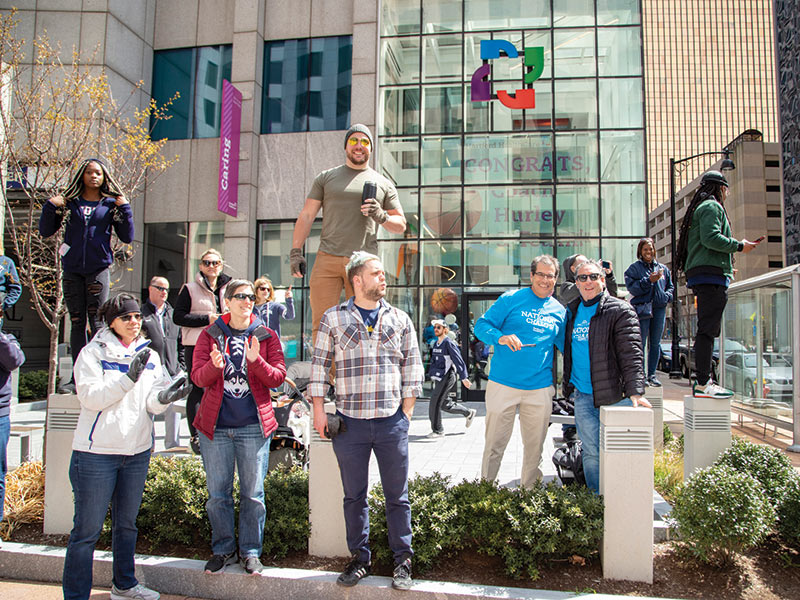
Fostering friendship
There are many ways employers and managers can create an environment that helps colleagues forge friendships, starting with being interested in their lives outside of work. This atmosphere, Dr. Ferrand says, shows value for social bonding.
Other tips include:
- Be less formal. While projects and deadlines definitely need attention, it doesn’t mean you can’t be creative with structure. For example, try lightening up meetings when possible. Try a walking meeting on a nice day. The simple act of being outdoors and walking relaxes people, allowing their creative juices to flow.
- Ask questions. In one to one meetings, try asking about their lives in general. If you see something telling — like a gym bag or takeout container advertising a restaurant, ask about it. Knowing what someone enjoys can help you understand what motivates them.
- Try team building activities. This doesn’t have to be organized or during the work day. Suggest an outing after work on a Friday or schedule a monthly potluck lunch.
- High-five. Give recognition freely. Try sharing something on LinkedIn about your team as a surprise
Do you have a work bestie? Share your story and photo by emailing susan.mcdonald@hhchealth.org.
With Each Journey Comes a Purpose
by Maggie Werner
Who is Enileika “Eni” Lopez-Riddle? She’s someone who loves to advocate, mentor and see personal growth. She’s confident in who she is — an ambitious, outgoing and determined woman who no longer suffers from depression.
Today, there is no doubt Lopez-Riddle knows who she is and her purpose.
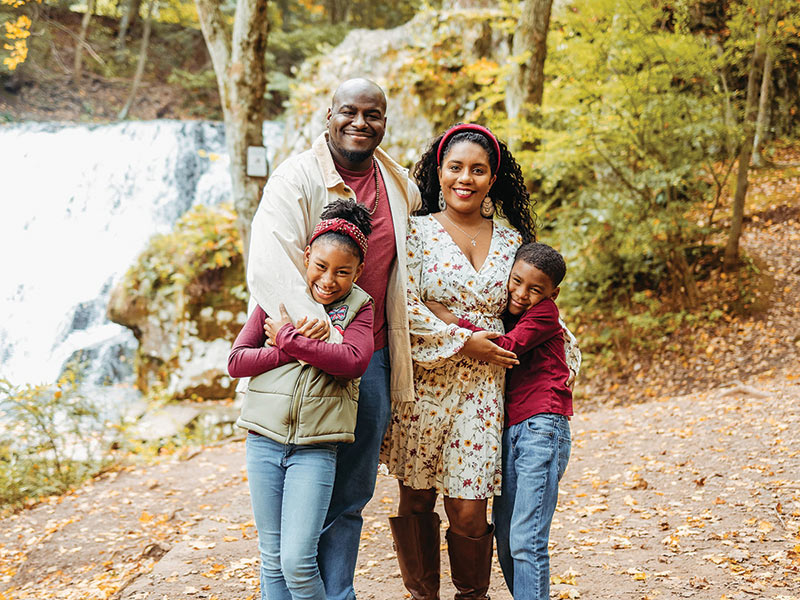
However, if you ask who she was the year before, the answer would be different.
It started after her parents split up in 2005. “I think a breakup for any family is complete heartbreak,” Lopez-Riddle begins. “To make matters worse, my mom underwent surgery a few months later and was diagnosed with cancer.”
The cancer spread and her mother passed away in November 2006. Depression hit Lopez-Riddle like a truck. The foundation she had known quickly crumbled. A young woman, fresh out of high school and still trying to figure out who she was had lost the biggest pillar of her life.
Not long after, Lopez-Riddle moved to Puerto Rico to live with her grandmother and finally started to rebuild herself. She returned to the mainland a year later and, at 19, decided to start a career, applying for a free certified nursing assistant (CNA) program.
“My mom was a CNA, so when I joined the program, my purpose began to align,” she says. Three months later, she passed at the top and as president of her class. By August 2010, Lopez-Riddle was a full-time CNA at Hartford HealthCare. She found she enjoyed helping others.
“Taking care of people who also suffered depression, lost family members to cancer, and were losing their own lives to cancer — that’s what led me to my purpose,” Lopez- Riddle says.
The young woman who started as a CNA is now a practice manager and leader within the Hispanic and Latinx Colleague Resource Group. She is a wife and mother of two beautiful children, and, most importantly, a woman who knows her purpose.
There were many bumps, but because Lopez- Riddle navigated through them, she can now be strong for others. As someone lacking a support system when she needed it most, she lets people know they are not alone.
“It may feel like nobody will ever understand you and your situation, but know there are people out here who care and want to help,” she says. “Know that it’s OK to lean on someone and share what you’re going through. You are strong enough to get through this, and with each journey comes a purpose.”
